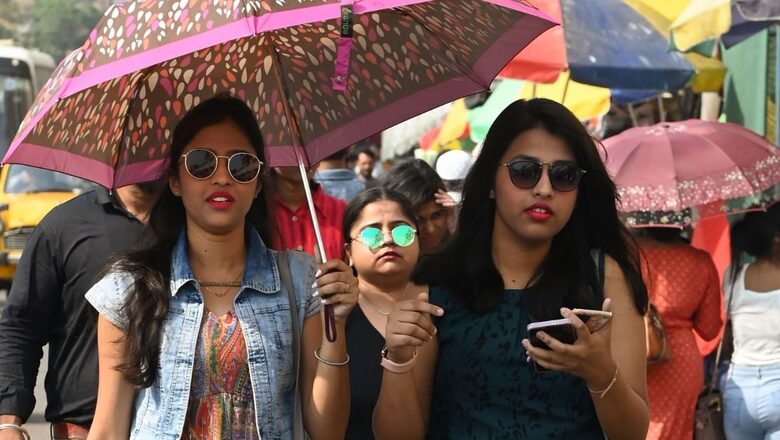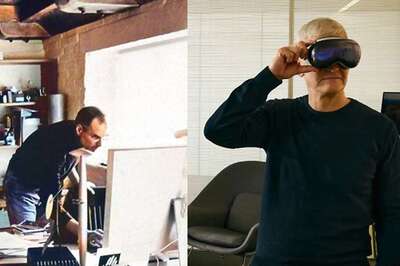
views
After attending a large public gathering in an open ground in Navi Mumbai, more than eleven people died due to heatstroke and thousands of others suffered from dehydration and other health conditions.
Deaths due to heatstroke are not uncommon in India. Cases of heatstroke are reported in the emergency departments of hospitals starting in April almost every year. This year is no different, and hospitals in several states and cities are already noticing the incoming patients.
The classic symptoms of having a heat stroke includes a high body temperature, hot and dry skin, rapid heartbeat, headache, dizziness, nausea, confusion, and unconsciousness. In such condition, a person should seek medical attention immediately.
News18.com declutters heat stroke and how hospitals across India deals with it every year.
What is a heatstroke?
It is a potentially life-threatening condition that occurs when the body’s internal temperature rises to a dangerous level, typically above 40°C or 104°F.
Heat stroke can occur when the body is exposed to high temperatures, especially when combined with high humidity and/or physical exertion.
“It is a serious and potentially life-threatening condition that should be taken seriously,” Dr Manish Maheshwari, consultant, internal medicine, Narayana Multi-speciality Hospital, Ahmedabad told News18.com. The region is reporting average temperature of around 40 degrees for the last one week.
“As we started facing heat waves, the number of hospitalisations has also gone up. We are admitting 5-6 cases every day,” he said, adding that in summer from April to June, we witness a large number of cases every year.
Similarly, Dr Sandeep Jain, consultant, interventional pulmonology at Narayana Superspeciality Hospital, Kolkata’s Howrah, is also witnessing the rising number of cases of heat stroke in his hospital. He pointed out that the trend is similar to previous years. “Last year also, the number of patients with heatstroke started rising in April and continued till May and mid-June.”
The severity from the stroke depends on various factors such as age, exposure, and health conditions.
Typically, hospitals see heat strokes and heat exhaustion patients during April and May, and after June these cases gradually reduce as the monsoon starts setting in.
Dr Ajay Aggarwal, director and head, internal medicine at Fortis in Uttar Pradesh’s Noida, believes that with the increasing global warming, the number of patients are just increasing every season.
He said his hospital witnesses 4-5 patients with heat stroke on an average in summer.
At Maharashtra’s Nanavati Max Super Speciality Hospital, no actual admissions in the last week have taken place but they have seen some outpatients with symptoms of severe exhaustion and dizziness.
“These patients reported symptoms after a trip or in some field agents among other factors which was attributed to heat exhaustion,” Dr Hemalata Arora, senior consultant, internal medicine at the hospital said.
“In the interiors of Maharashtra where the temperatures soar above 40 degrees regularly, these cases are seen much more. But in Mumbai, we see them more during peak summer (in mid-May) generally effecting elderly people who have been outdoors.”
All of these above states and cities are reporting temperatures touching 40 degrees and above regularly in the past one week.
Who Needs Should Be Careful?
People in extremes of age need to be especially careful, medical experts pointed out.
Also, people with diabetes and blood pressure should also be careful as some of the medications cause loss of water due to which people can easily get dehydrated and suffer heat stroke.
According to Dr Anup Latne, consultant at internal medicine at Surya Mother and Child Super Speciality Hospital in Pune, children and pregnant women should take additional precautions to mitigate the effect of severe heat, and avoid going outdoors during the day.
Some symptoms to watch out for include dizziness, sweating profusely, vomiting and muscular cramps.
“Expecting mothers should, however, avoid caffeine as it can make them lose more fluids and worsen the symptoms of heat exhaustion. Instead, they should consume beverages such as fresh fruit juice and buttermilk,” Latne said.
If children or pregnant women need to go outdoors during the day, doctors recommend using an umbrella to avoid exposure to direct sunlight. The effects of heat on children can also be lowered by using water to clean their faces and hands during school.
“Some other ways we can lower the effect of heat on our body are by reducing our protein intake, increasing the consumption of fruits and vegetables with high water content, and wearing loose-fitting clothes, he added.
What is the treatment?
Dr Maheshwari from Narayana Multi-speciality Hospital explained that the post-hospitalisation treatment involves cooling measures, such as intravenous fluids or the use of a cooling blanket.
Medications are also administered such as muscle relaxants or sedatives to control seizures, agitation, or shivering.
Dr Jain from Howrah also concurred and added that such cases are managed in an emergent setting with measures such as intravenous fluids or the use of a cooling blanket.
“Usually, it takes 3-4 days for the patients to recover fully.”
How to Protect?
To protect yourself from heatstroke, it is important to stay hydrated by drinking plenty of water, avoiding strenuous outdoor activities during the hottest parts of the day, wearing loose-fitting, lightweight clothing, and using sunscreen to protect against sunburn.
“Whenever possible, stay cool, and never leave children in parked cars. By taking these precautions, we can reduce the risk of heatstroke and ensure that we stay safe and healthy,” Maheshwari said.
Arora from Nanavati Max Super Speciality Hospital said keeping oneself hydrated is the key.
“Make sure that we are hydrating every half hour, drinking something liquid. Liquids do not mean carbonated beverages or coffees and teas because they actually are can be diuretics, which remove more water and cause further dehydration.”
“Instead one should drink juicy, watery foods such as cucumbers, watermelon, melon and other fruits. Also, avoid very high protein diets,” Arora said.
Read all the Latest Explainers here


















Comments
0 comment